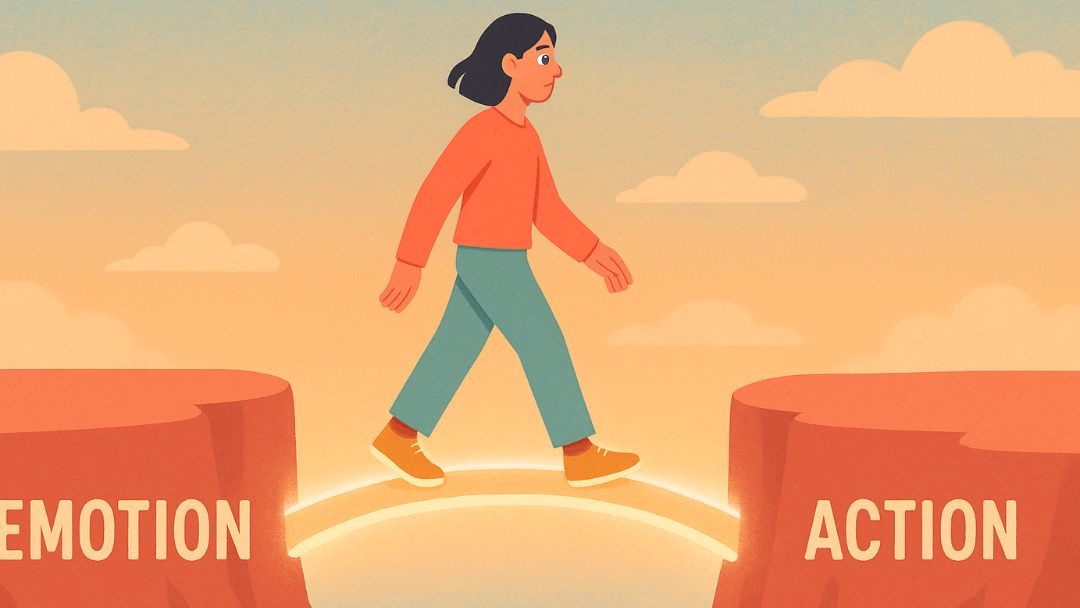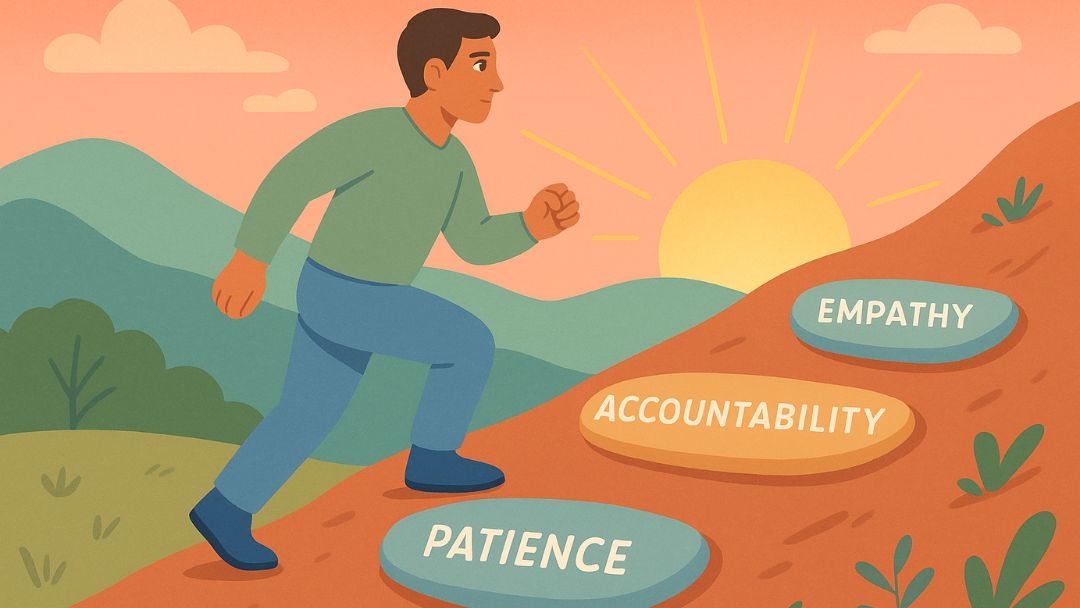10 Signs You’re Becoming More Emotionally Mature — Why Emotional Maturity Matters
Emotional maturity isn’t about staying calm all the time — it’s about understanding, regulating, and expressing your emotions with self-awareness and empathy. Learn the key signs of emotional maturity, how to recognize them in your daily life, and practical ways to grow stronger, kinder, and more resilient from the inside out.


Back
6 mins read
Truth be told, a few years ago, I was pretty dramatic in my relationship. I often let my emotions lead instead of logic. I’d brush off issues, pretend everything was fine, and then blow up about the same thing long after my partner thought we’d resolved it. In short, I was emotionally immature.
Emotional maturity isn’t about being calm all the time or never losing your temper. It’s about how you respond when strong feelings arise — knowing when to speak up and when to stay silent instead of react.
An emotionally mature person doesn’t suppress emotions; they acknowledge them, regulate them, and express them in ways that bring understanding instead of chaos.
In a world where quick reactions dominate both online and offline, emotional maturity stands out as a quiet strength. It’s the bridge between recognizing your emotions and mastering how you handle them — even around difficult or toxic people. It’s what helps relationships, work, and personal growth thrive.
In this article, we’ll explore what emotional maturity really means, the key signs of emotional maturity (and immaturity), and practical ways to develop it to strengthen every type of relationship — romantic, professional, and platonic.
What Is Emotional Maturity?

At its core, emotional maturity is the ability to manage your emotions and actions in ways that align with your values and show respect for others. It involves emotional awareness, self-control, empathy, accountability, and resilience.
While emotional intelligence is about understanding emotions — both yours and others’ — emotional maturity is about applying that understanding. It’s what turns emotional intelligence from theory into daily practice.
Emotionally mature people don’t let their moods dictate their behavior. They recognize feelings without being ruled by them. They can admit mistakes, adapt to change, and handle discomfort without blaming or shutting down.
Benefits of Emotional Maturity
Emotional maturity impacts nearly every area of life — from your mental health to your relationships and career success.
- Relationships — It helps you connect without control, love without losing yourself, and resolve conflicts without causing harm.
- Work and Career — It allows you to collaborate, give and receive feedback, and manage stress or pressure gracefully.
- Personal Well-Being — Healthy emotional regulation reduces anxiety, stress, and guilt, creating more peace, improved well-being, and better decisions.
- Individual Growth — It deepens self-awareness and emotional independence, helping you respond with wisdom instead of impulse.
Psychologically, emotional maturity strengthens the areas of the brain responsible for empathy, reasoning, and self-control. Each time you pause, reflect, or respond with calm awareness, you’re literally rewiring your brain for resilience.
10 Signs You Are an Emotionally Mature Person

Emotional maturity isn’t something you’re born with — it’s something you build and that grows with experience. It shows up in how you respond when life tests your patience, challenges your ego, or pushes your emotional buttons.
Over time, you start to notice small but powerful shifts: you pause before reacting, take responsibility instead of blaming, and handle conflict with calm rather than chaos.
Here are ten clear signs you’re growing emotionally stronger — and learning to lead your feelings instead of being led by them.
1. You Take Responsibility for Your Actions
Emotional maturity shows in how you handle mistakes.
Instead of blaming others or circumstances, emotionally mature people own their behavior. When something goes wrong, they look inward first — asking What can I learn from this? rather than Who can I blame? Accountability builds trust and self-respect, both key ingredients of maturity.
2. You Manage Your Emotions Without Suppressing Them
Emotionally mature people don’t avoid their feelings — they understand them.
You allow yourself to feel anger, sadness, or frustration, but you don’t let those emotions take control. You know how to pause before reacting and choose your response intentionally. This skill is especially helpful when dealing with difficult or toxic people.
3. You Communicate Clearly and Honestly
Clear communication is one of the strongest signs of maturity.
Emotionally mature people say what they mean — kindly, clearly, and without manipulation. They don’t expect others to read their minds or guess their needs. Instead, they communicate boundaries and desires directly, building healthier, more balanced relationships.
4. You Accept Differences Without Needing to Be “Right”
Emotionally mature people understand that disagreement isn’t disrespect.
Disagreements no longer feel like personal threats. You can listen to opposing views without taking things personally. This flexibility shows inner confidence — a sign that your self-worth doesn’t depend on being right or validated.
5. You Can Apologize — and Mean It
The ability to apologize reveals real emotional growth.
True maturity shows in how you handle being wrong. You can say “I’m sorry” without adding “but…” or shifting blame. Apologies become opportunities for connection and growth instead of a loss of pride.
6. You Respect Boundaries — Yours and Others’
Respecting boundaries is emotional maturity in action.
You understand that everyone needs personal space, both emotional and physical. You set healthy boundaries without guilt and respect when others do the same. Boundaries prevent resentment and keep relationships healthy and sustainable.
7. You Don’t Seek Constant Validation
An emotionally mature person knows their worth without external approval.
They value feedback but don’t crumble without it. You can appreciate compliments, but you no longer depend on them. Your confidence comes from within, not from likes or attention.
8. You Embrace Imperfection
Emotional maturity means accepting your humanity.
You’ve made peace with the fact that mistakes and flaws are part of being human. Instead of striving for perfection, you focus on progress and authenticity. That acceptance frees you — and those around you — from unrealistic expectations.
9. You Adapt Instead of Reacting
Mature people adjust gracefully when life changes.
Whether it’s a breakup, a career shift, or a personal setback, you learn, adapt, and move forward without harboring resentment. Change doesn’t threaten your stability; it strengthens it.
10. You Extend Empathy — Even When It’s Hard
Empathy is one of the highest forms of emotional maturity.
It doesn’t mean you agree with everyone, but you try to understand where they’re coming from. This ability to see another perspective builds compassion and breaks cycles of blame or defensiveness.
How to Develop Emotional Maturity: 8 Tips for Growth

Emotional maturity doesn’t happen overnight — it grows with awareness, practice, and patience. And while it’s closely tied to emotional intelligence, they’re not quite the same. Emotional intelligence is made up of different skill areas: self-awareness, self-regulation, motivation, empathy, and social skills.
When one of these areas is underdeveloped, emotional immaturity can show up in different ways.
Some people might struggle with anger or impulsiveness, while others avoid conflict or shut down when emotions run high. You might be strong in empathy but weak in self-control — or great at managing your feelings but uncomfortable expressing them.
That’s why the first step in developing emotional maturity is assessing your emotional intelligence skills (EQ).
Understanding where you’re already strong and where you need growth helps you focus your effort instead of trying to change everything at once. Once you have that foundation, you can start building new habits that strengthen emotional balance, awareness, and resilience — the hallmarks of maturity.
The following strategies are simple but powerful ways to start growing in emotional maturity, no matter where you are in the process.
1. Observe Before Reacting
Emotional maturity begins with awareness. When you feel triggered, pause. Take a breath, name the emotion, and ask what it’s trying to tell you. That small space between feeling and reacting is where self-control grows.
2. Practice Emotional Honesty
You can’t manage what you don’t acknowledge. Instead of hiding or rationalizing emotions, be honest about what you feel. Say, “I’m angry,” or “I’m hurt,” without judgment. Awareness creates understanding — and understanding creates control.
3. Journal or Reflect Daily
Writing builds emotional clarity. Journaling or quiet reflection helps you identify patterns — recurring triggers, fears, or beliefs that drive behavior. Seeing them on paper brings insight and self-awareness, both key to emotional growth.
4. Seek Feedback — Then Listen
Other people can be mirrors for our blind spots. Ask people you trust how you handle stress, conflict, or feedback. Don’t defend yourself — just listen. That willingness to learn signals genuine maturity.
5. Strengthen Empathy
Empathy is emotional intelligence in motion. When you disagree, try summarizing the other person’s perspective before responding. It trains your brain to understand first and react second — a hallmark of maturity.
6. Take Responsibility — Always
Accountability keeps your emotional power in your own hands. If you mess up, own it. Avoid excuses or blame. Every time you take responsibility, you reinforce self-respect and trust.
7. Embrace Discomfort as Growth
Growth and comfort rarely coexist. Emotional maturity often develops through pain — heartbreak, failure, or rejection. Instead of avoiding discomfort, ask, What is this teaching me? Each challenge becomes a chance to grow stronger.
8. Set Boundaries with Compassion
Boundaries are love in structure. Saying “no” doesn’t make you cold — it makes you healthy. Respecting your limits (and others’) creates relationships built on safety, not sacrifice. Compassionate boundaries are the backbone of emotional balance.
Related: How to Build Emotional Capacity and Keep Your Bucket from Overflowing
Emotional Maturity Requires Practice

Emotional maturity isn’t a final destination — it’s an ongoing journey of awareness, humility, and growth. You won’t always respond perfectly, but each time you pause instead of react, listen instead of defend, or empathize instead of accuse, you build another layer of strength and wisdom.
Looking back, I can see how my own growth came from learning to be accountable — not just for my emotions, but for how I expressed them.
I used to believe my reactions were justified because of how someone else behaved. Over time, I realized that emotional maturity means taking ownership of my side of the equation, even when the other person doesn’t. That shift changed how I communicate, how I handle conflict, and how I show up in love and connection.
In many ways, this is what it truly means to be an adult in a relationship — choosing emotional steadiness over emotional reactivity and building patterns that support respect, safety, and honesty.
True maturity isn’t about being emotionless — it’s about being emotionally free.


Return to Blog




